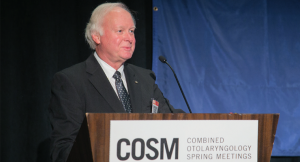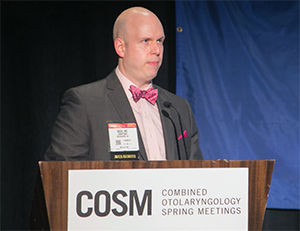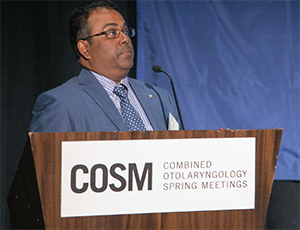SAN DIEGO—Otolaryngologists and other healthcare professionals gathered April 28–29, 2017, in San Diego for the 120th Annual Meeting of the Triological Society, held in conjunction with the Combined Otolaryngology Spring Meetings (COSM), catching up with colleagues from around the globe, sharing their research, and discussing pressing topics in the field.
Explore This Issue
June 2017The meeting included more than 50 presentations from the podium and nearly 150 poster presentations, as well as several lively panel discussions. At least 2,646 professionals registered for COSM, including 1,361 physicians. Of those, some 396 were Triological Society members.

Charles Beatty, MD, Triological Society President
In the Triological Society presidential address, Charles Beatty, MD, underscored how important a positive attitude is for professional success, and specifically for medicine. “It’s been my observation that the most common and, perhaps, essential character traits of successful colleagues and leaders is a positive, can-do attitude. I suspect that most of the individuals you admire in your lives and careers have also been positive, upbeat, glass-at-least-half-full people,” he said. “When these people are asked to take on a new task, see an additional patient, face a new challenge, they almost always just say ‘yes.’”
He also shared several points about positivity from his own life and career:
- His parents nurtured a positive culture growing up, he said. He doesn’t remember ever being asked in dinner table conversation whether he or his siblings would go to college; it was assumed they all would.
- Dr. Beatty was asked to be a program director at a time when he thought he might be unprepared for the job, but he took the job anyway. “This ultimately led to getting involved in the Mayo Graduate School of Medicine and becoming associate dean of surgery and surgical specialties for 10 years. Not exactly the route or the destination that I had anticipated, but sometimes it pays to just say ‘yes.’”
- He pointed to Frances Kinne, PhD, a family friend and Chancellor Emeritus of Jacksonville University in Florida, who is about to turn 100, as an example of this can-do outlook. When the two of them speak, Dr. Beatty said, “Inevitably, she’ll turn the conversation around and ask, ‘What wonderful things have you or the boys or [his wife] Ann accomplished? Is Ann the mayor of Rochester yet?’ Dr. Kinne is one of the most humble but enthusiastic people who encourage others to pursue the highest achievements.”
- He hopes that prospective members of the Triological Society have this outlook when considering membership. He reminded the audience that the society awarded $600,000 over the past year on career development and career scientist grants, and travel grants and other awards for students, residents, and junior staff. The society offers an open forum for the exchange of ideas and teaching.
“My one admonition to you is just say ‘yes’ when asked to participate or join the Triological Society,” he said. “Too often, we hear from the pessimists and the cynics. We hear about complaining, condemning and criticizing. But most successful people recognize life is what you make of it.”
Thomas R. Collins is a freelance medical writer based in Florida.
Triological Society New Fellow Thesis Award Winners
Harris P. Mosher Thesis Award
 The 2017 Mosher Award went to Jonathan M. Bock, MD, associate professor of otolaryngology at the Medical College of Wisconsin in Milwaukee.
The 2017 Mosher Award went to Jonathan M. Bock, MD, associate professor of otolaryngology at the Medical College of Wisconsin in Milwaukee.
Dr. Bock and his team set out to better understand the natural clinical progression of aspiration to pulmonary compromise by doing a retrospective chart review of patients who have aspirated. They examined the cause for aspiration and whether patients went on to develop pneumonia, pneumonitis, or another life-threatening pulmonary illness.
Among the 564 patients found to have aspirated on videofluoroscopic swallowing study (VFSS) at their center in 2009 and 2010, the researchers found that certain causes for dysphagia were highly associated with patients developing pulmonary events over the next 54 months, Dr. Bock said.
Those with dysphagia of an unknown origin who had general weakness, frailty, and deconditioning had a hazard ratio (HR) of 3.18 compared to those for whom stroke was the cause. Those with cricopharyngeal or esophageal dysphagia had an HR of 2.63, and those with post-surgical dysphagia an HR of 2.22, he said.
When researchers looked at mortality, they found the hazard ratios were increased for dysphagia of unknown origin, post-surgical dysphagia, and neurological etiology. They found no statistically significant association among penetration-aspiration score, modified diet, and rates of pneumonia or mortality.
Since there was no correlation between outcomes and diet, Dr. Bock said that the data suggest that clinicians should “at least consider more aggressive feeding regimens for patients in the end stages of their lives, when eating is perhaps one of their last few pleasures they have left.” He added, though, that more prospective studies are needed to further define the benefits of diet modification for patients with dysphagia.
Edmund Prince Fowler Thesis Award
 Syed Ahsan, MD, a head and neck surgeon at Kaiser Permanente in Anaheim, Calif., was awarded this year’s Fowler Award for his work demonstrating the therapeutic effects of deep brain stimulation (DBS) in an animal model.
Syed Ahsan, MD, a head and neck surgeon at Kaiser Permanente in Anaheim, Calif., was awarded this year’s Fowler Award for his work demonstrating the therapeutic effects of deep brain stimulation (DBS) in an animal model.
In work that was performed at Wayne State University in Detroit, researchers wanted to clarify the neural mechanisms at work in DBS-induced tinnitus suppression, and to test for tinnitus suppression by DBS with electrical stimulation of the caudate nucleus in a rat model.
The rats were exposed to noise to bring about tinnitus. The suppression of the tinnitus was then assessed using the acoustic startle reflex and evaluating the effects on neural indicators of tinnitus. Researchers found that DBS reduced the neural markers of tinnitus and behaviors that tend to determine tinnitus in this model. Dr. Ahsan said the study suggests that an indirect pathway is at work in the disorder.
The findings, he said, “will help in determining the mechanisms of tinnitus generation and help in determining the role of the non-auditory pathway in the generation of tinnitus or response to tinnitus.”